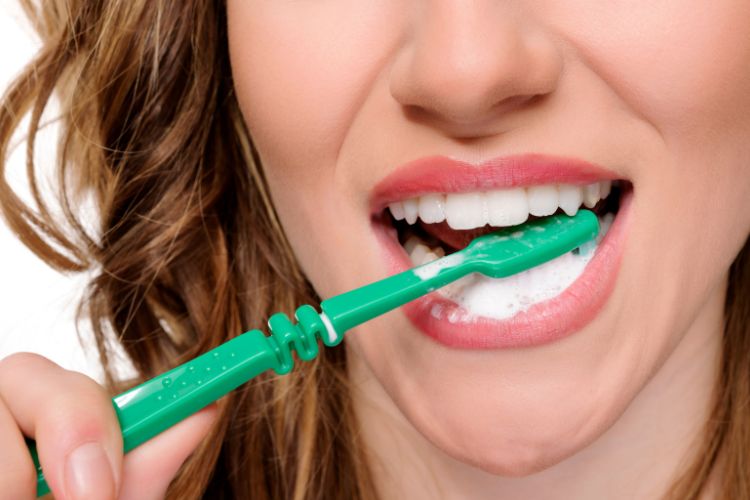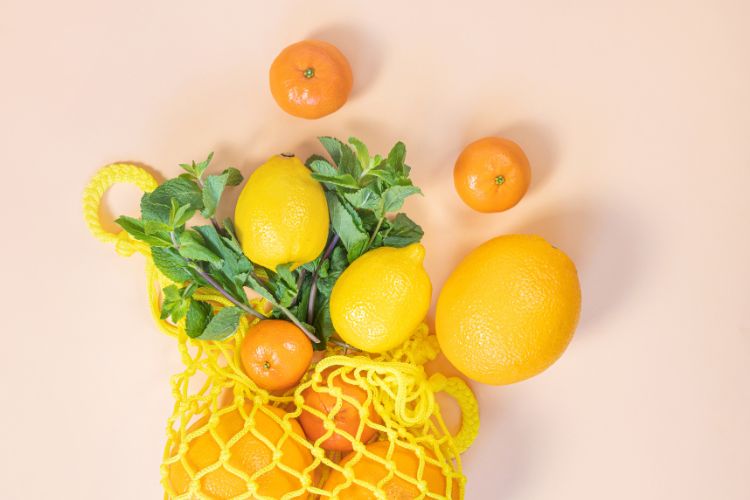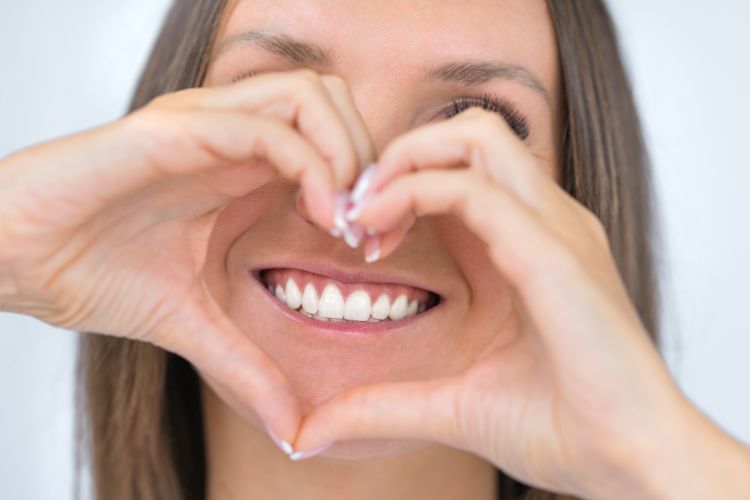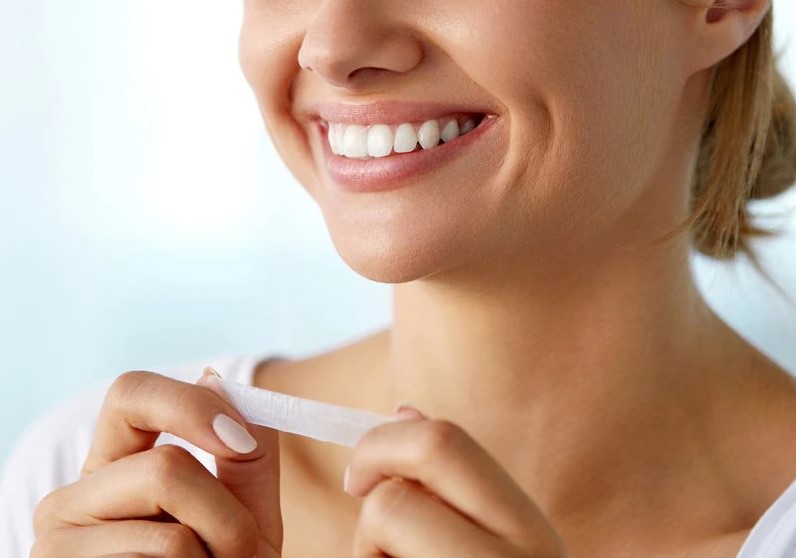We all want that dazzling bright smile to feel confident and healthy, inside and out. Sometimes, however, tooth discolouration is difficult to avoid in our caffeine and artificial food world. Fortunately, there are both natural and professional solutions.
Why Choose Natural Methods?
For those who are concerned about negative health risks of chemical products and chemical teeth whitening products, a natural approach may be an option for them if they desire whiter teeth.
Tooth sensitivity, gum irritation and prolonged uneven discolouration are other significant symptoms of misusing chemical teeth whitening products. The procedure usually involved using peroxide-based bleaching agents to break down stains and discolouration on the teeth. We recommend a thorough consultation with your dentist about the best way to begin your journey to a bright smile.

Top Natural Whitening Ingredients
Baking soda
This is a mild abrasive that can remove stains on your teeth with little discomfort. It might not taste nice, but mixing baking soda with water and brushing your teeth will gradually whiten them, and potentially reduce bacteria in your mouth.
To prevent any unintended side effects, KB Village Dental recommends using toothpaste with baking soda, to reduce its abrasiveness. You should also be mindful that baking soda doesn’t protect your teeth from plaque and cavities as effectively as fluoride toothpaste.
How to: Combine 1 teaspoon (6g) of baking soda with 2 teaspoons of water (5 ml) and mix until paste-like. Brush your teeth with the baking soda paste and rinse well. Repeat several times a week for the results to show.
Hydrogen peroxide
Recommended as a way to break down the molecules that cause tooth stains, hydrogen peroxide application must be consistent and safe to avoid enamel damage. Too high a concentration (such as 10-40%) and your teeth will be lightened faster but with a greater risk of enamel breakdown and tooth sensitivity. Studies have found that a lower concentration level (about 3%) causes greater damage when left on the teeth for longer periods. The American Journal of Dentistry recommends mouthwash with 1.5% hydrogen peroxide concentration levels.
How to: Hydrogen peroxide is available to purchase as mouthwash or toothpaste. Other alternatives are to make your own homemade hydrogen peroxide toothpaste, by mixing 2 teaspoons (10 ml) of hydrogen peroxide with 1 teaspoon (6g) of baking soda. Gently brush your teeth and rinse thoroughly, limiting use to a few times a week to avoid tooth enamel erosion.

Coconut oil
Swishing a tablespoon of edible oil around your mouth to protect your teeth, known as oil pulling, is a long-considered natural alternative to teeth whitening. Sure, coconut oil pulling has little to no side effects on your oral hygiene, but its effectiveness in reducing yellow teeth is different for everyone. The American Dental Association has yet to obtain conclusive scientific evidence of coconut oil’s benefits and instead notes anecdotal reviews that it can lead to an upset stomach and diarrhoea. Compared to other teeth-whitening alternatives, it is inexpensive and soothing for your gums.
How to: Put 1 tablespoon (15 ml) of solid coconut oil in your mouth and wait a few seconds for it to melt. Swirl the oil through your teeth in a push and pull motion. Continue pulling the oil for 15–20 minutes.
Remember to dispose of the coconut oil in the rubbish, as it will clog your drains once solid again.
Other natural agents to consider
- Charcoal strips are abrasive and useful to remove surface-level staining but will be unable to whiten anything internal.
- Turmeric, featured on many popular TikTok trends, is only anecdotally known to assist with teeth-whitening and lacks conclusive scientific evidence.Sometimes it is mixed with baking soda to aid the discolouring process and turmeric is historically known as an anti-inflammatory herb, so it works well to protect your gums.
- Apple cider vinegar’s high acidity means it can quickly whiten teeth. However, new studies reveal that its pH properties have a higher risk of destroying teeth enamel. Tooth enamel is the strongest substance in your body, yet due to the lack of living cells, it cannot heal once it is destroyed. Similarly, it’s a myth that you can safely whiten your teeth by combining baking soda and lemon juice — the mixture is too acidic for the surface of your teeth.
Incorporating foods such as citrus, strawberries, pineapples and dairy products into your diet is known to prevent tooth discolouration and tooth decay. The vitamin C, malic acid, lactic acid and bromelain in these foods strengthen your teeth and lift some colouring in them. Moreover, crunchy fruit and vegetables, leafy greens, nuts and seeds increase saliva production, which scrubs away plaque and bacteria in your mouth.

When to See a Professional
Before you decide to try home tooth whitening remedies, you should have a dentist check for any signs of cracks or decay in your teeth. They will recommend the safest and most effective treatment method for you.
For example, surface stains from coffee or tea may not be the cause of your tooth discolouration. You may have other teeth, gum, or mouth problems only a dental practitioner can diagnose. Similarly, tooth whitening may not be suitable for you if you have sensitive teeth, or crowns or fillings.
If you experience any pain while whitening your teeth, or observe a deterioration in your tooth enamel, book an appointment with a dental practitioner immediately.
KB Village Dental is dedicated to supporting you achieve your desired smile. Our expert team of dentists is happy to help provide personalised advice and information about whitening your teeth naturally or cosmetically. In-office tooth whitening procedures can last up to three years if maintained with good oral hygiene. Otherwise, your dentist can offer recommendations for alternate at-home teeth whitening products like whitening toothpaste, mouthwash, pens, strips and gels to complement your treatment for an extra week to six months.
If you think your smile could be brightened, or are concerned about your oral health, contact Sydney North Shore dentist KB Village Dental at (02) 9964 9166 to book an appointment today.


